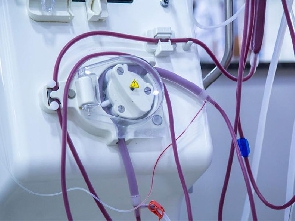 Dialysis is required to extend the life span of kidney disease patients
Dialysis is required to extend the life span of kidney disease patients
At least 2 or 3 times every week, a kidney patient in Ghana has to visit the hospital for what is called dialysis.
Dialysis is a procedure to remove waste products from a person’s blood when the kidney which is supposed to filter blood fails or is infected.
During each dialysis session, a kidney patient’s blood is removed from their body through the needle, sent across a special filter that removes harmful substances from the blood, after which the clean blood is transferred back to the body.
This session is very expensive and financially draining on individuals who have to go through it. In Ghana, for instance, an average amount of GHC 600 is required for every dialysis session in addition to other medications which may cost close to GHC 300.
Kidney failure patients who want to have a longer chance of surviving the disease have to constantly visit the hospital every week which means depending on whether an individual is doing 2 or 3 sessions, they would either be paying either GHC 7,200 or GHC 10,800 every month on dialysis.
Failure to continue and be consistent with the sessions means the individual may risk dying.
Detailing more about the severity of the situation, Philip Atawurah, a lecturer at the Ghana Institute of Journalism who has been on dialysis for the past two years explained to GhanaWeb's Daniel Oduro on The Lowdown;
“As I speak, at my center; Korle Bu cannot take all of us so after admission, they give you a list of centers, and you pick the one that is closer to you. At the moment, at my center, a session is 650 cedis, and that’s just the dialysis.
“And you have to take what is called EPO Iron injection, so that your blood levels do not drop. There are two ways to make sure that your iron levels do not drop. One – your kidney does not produce the iron needed for blood production so sometimes your blood will drop if you have a kidney issue,” he said.
Adding,
“And two – Because the blood passes through the dialyser or the machine, obviously at the end of every session, there is some amount of blood that is taken by the machine so you always need to be on these medications to give you that optimum level of blood and that’s 230 cedis. So you add 230 cedis to 650 cedis, that’s 900 cedis and that’s what I pay per session and I do 2 sessions a week so we are looking at about 1,800 a week for just 2 sessions of dialysis.
“When the economy challenges also came, it also impacted because all these, the materials we use for dialysis are imported. Especially from the last 3 months, there’s been an increase in price of dialysis. Of course, moving from 320 cedis to 900 cedis in just 2 years should tell you what the exchange rate has done to us,”

Donate to support Philip
What can be done:
Organ transplant is one of the ways to ease the financial burden off individuals who have kidney diseases and need to be on dialysis constantly to survive.
Organ donation and transplantation is a crucial aspect of healthcare that can save lives and improve the quality of life for many individuals. In Ghana, organ donation and transplantation are recognized as essential medical interventions, and efforts are being made to promote awareness and legislation in this area.
As much as organ transplant is expensive, Urologist at the Korle Bu Teaching Hospital, Prof. Matthew Kyei, has noted that doing a transplant saves the individual the accumulated cost of undergoing dialysis which doesn’t even come with a guarantee of health after some 5-10 years.
Organ transplants cannot however be done without any legal documents or laws in place to ensure organs such as the kidney are harvested legally and available for kidney patients.
Currently, Ghana lacks any proper laws that will make way for human organs to be harvested, donated and transplanted.
It is why Ghana’s leading digital news platform, GhanaWeb, in conjunction with the Korle Bu Teaching Hospital is embarking on an aggressive campaign which is geared towards ensuring that parliament will pass a comprehensive legislation to guide organ harvesting, organ donation and organ transplantation in the country.
You can also watch these episodes of Lowdown on GhanaWeb TV: